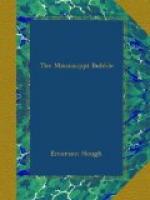“’Tis our own, mon enfant,” replied Du Mesne, dryly. “’Twas perhaps the property of the Iroquois a moon ago. A moon before that time the soil it stands on belonged to the Illini. To-day both house and soil belong to us. See; here stood the village. There are the cornfields, cut and trampled by the Iroquois. Here are the kettles of the natives—”
“But, but—why—what is all this? Why do we not hasten away?” broke in Jean Breboeuf.
“Pish! We do not go away. We remain where we are.”
“Remain? Stay here, and be eaten by the Iroquois? Nay! not Jean Breboeuf.”
Du Mesne smiled broadly at his terrors, and a dry grin even broke over the features of the impassive old trapper, Tete Gris.
“Not so fast with your going away, Jean, my brother,” said Du Mesne. “Thou’rt ever hinting of corn and the bean; now see what can be done in this garden-place of the Iroquois and the Illini. You are appointed head gardener for the post!”
“Messieurs, me voila,” said Jean Breboeuf, dropping his hands in despair. “Were I not the bravest man in all New France I should leave you at this moment. It is mad, quite mad you are, every one of you! I, Jean Breboeuf, will remain, and, if necessary, will protect. Corn, and perhaps the bean, ye shall have; perhaps oven some of those little roots that the savages dig and eat; but, look you, this is but because you are with one who is brave. Enfin, I go. I bend me to the hoe, here in this place, like any peasant.”
“An excellent hoe can be made from the blade bone of an elk, as the woman Wabana will perhaps show you if you like,” said Pierre Noir, derisively, to his comrade of the paddle.
“Even so,” said Jean Breboeuf. “I make me the hoe. Could I have but thee, old Pierre, to sit on a stump and fright the crows away, I make no doubt that all would go well with our husbandry. I had as lief go censitaire for Monsieur L’as as for any seignieur on the Richelieu; of that be sure, old Pierre.”
“Faith,” replied the latter, “when it comes to frightening crows, I’ll even agree to sit on a stump with my musket across my knees and watch you work. ’Tis a good place for a sentinel—to keep the crows from picking yet more bones than these which will embarrass you in your hoeing, Jean Breboeuf.”
“He says the Richelieu, Du Mesne,” broke in John Law, musingly. “Very far away it sounds. I wonder if we shall ever see it again, with its little narrow farms. But here we have our own trails and our own lands, and let us hope that Monsieur Jean shall prosper in his belated farming. And now, for the rest of us, we must look presently to the building of our houses.”
Thus began, slowly and in primitive fashion, the building of one of the first cities of the vast valley of the Messasebe; the seeds of civilization taking hold upon the ground of barbarism, the one supplanting the other, yet availing itself of that other. As the white men took over the crude fields of the departed savages, so also they appropriated the imperfect edifice which the conquerors of those savages had left for them. It was in little the story of old England herself, builded upon the races and the ruins of Briton, and Koman, and Saxon, of Dane and Norman.




